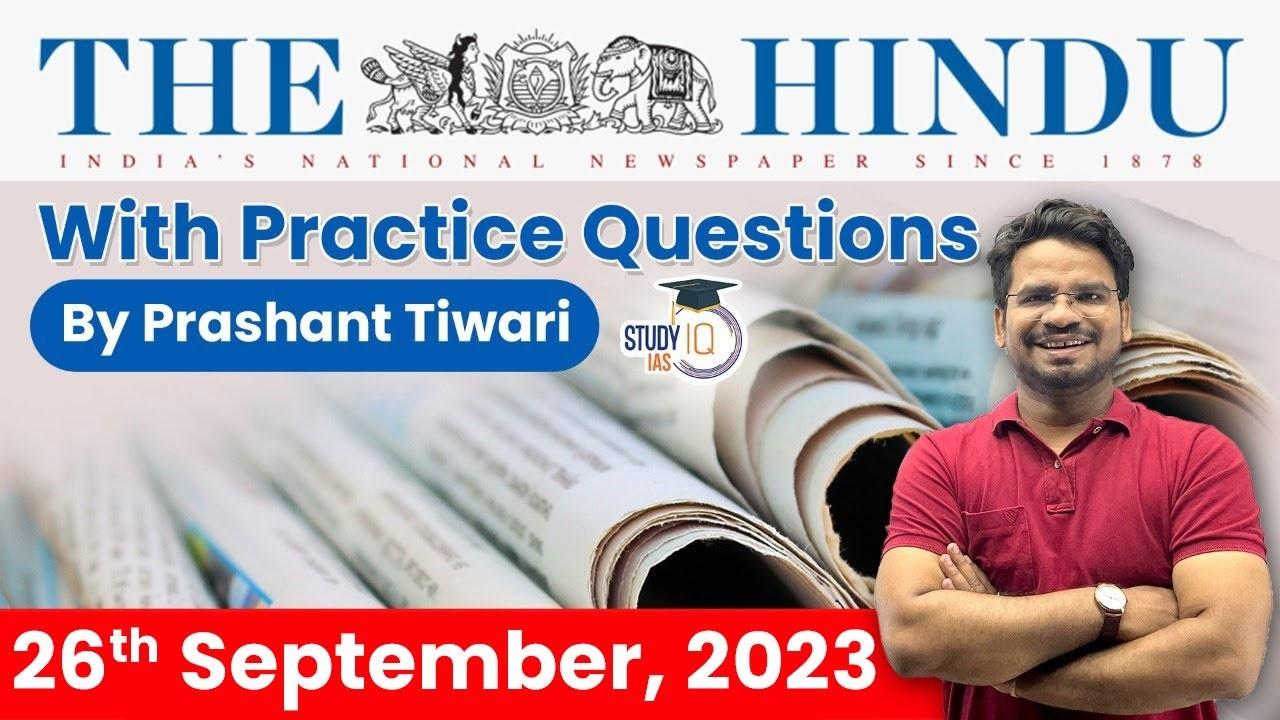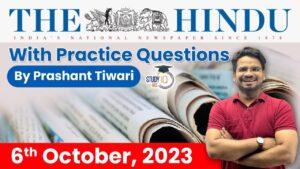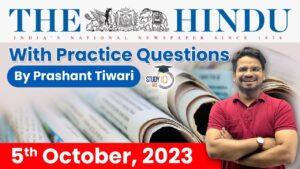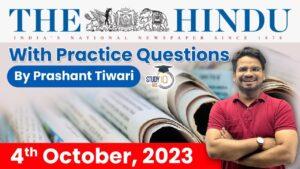The Hindu Newspaper Analysis for UPSC

The Hindu Newspaper Analysis 25 September 2023

- Tibetans are asking for more autonomy but not political separation, asserts the Dalai Lama, adding that while he wishes to revisit Lhasa, he will prefer to live on in Dharamshala.
- Speaking to journalists at his home in Dharamshala on Monday, ahead of what is expected to be a gruelling series of trips around India, including visits to Sikkim, Karnataka, and Bodh Gaya in Bihar this year, the Dalai Lama repeated some of the seemingly conciliatory remarks he has made in the past.
- China has, however, rejected these remarks, accusing the Dalai Lama, who has lived in exile in India since 1959, of being a “splittist” or separatist.
- For centuries, Tibet was India’s actual neighbour, as most of India’s boundaries and the 3500km LAC is with the Tibetan Autonomous Region, and not the rest of China.
- In 1914, it was Tibetan representatives, along with the Chinese that signed the Simla convention with British India that delineated boundaries.
- However, after China’s full accession of Tibet in 1950, that China repudiated the convention and the McMahon line that divided the two countries.
- Further, in 1954, India signed an agreement with China, agreeing to recognize Tibet as “Tibet region of China”.
- In 1959, following the Tibetan uprising, the Dalai Lama (spiritual leader of Tibetan people) and many of his followers fled to India.

- Securing an agreement on almost a hundred issues on the agenda, apart from that on the Russia-Ukraine war, was no mean achievement.
- From condemnation of terrorism to climate issues, from trebling of renewable energy capacity to matters such as lifestyle for sustainable development and reform of multi-lateral development banks, apart from highlighting India’s contributions such as digital public infrastructure and Unified Payments Interface, the Declaration seemed to echo the prevailing mood in the G-20 of favouring compromise over conflict and fully endorsing Prime Minister Narendra Modi’s dictum of “One Earth, One Family, One Future”.
- The difference between two Declarations is that while Bali was accusatory in tone, New Delhi sought a resolution to the conflict. Russia and China have since hailed the New Delhi Declaration in sharp contrast to their criticism of the Bali Declaration.
- For India, which is a founder-member of the G-20, formed in 1999 as a grouping of Finance Ministers and Central Bank Governors (it was upgraded to summit level in 2008), and which hosted the G-20 meeting in 2002 (of Finance Ministers and central bank governors), the world has come full circle.
- China’s perception, need for caution
- The return of two blocs

- India is to host the first-ever global summit on Artificial Intelligence (AI) this October. Additionally, as the Chair of the Global Partnership on Artificial Intelligence (GPAI), India will also be hosting the GPAI global summit in December. These events suggest the strategic importance of AI, as it is projected to add $500 billion to India’s economy by 2025, accounting for 10% of the country’s target GDP.
- One area where India can assume leadership is how regulators address children and adolescents who are a critical (yet less understood) demographic in this context.
- UNICEF’s guidance for policymakers on AI and children identifies nine requirements for child-centred AI which draws on the UN Convention on the Rights of the Child (India is a signatory).

- In declining to interfere with the order of the Cauvery Water Management Authority (CWMA), directing Karnataka to release 5,000 cubic feet of water per second (cusecs) to Tamil Nadu until September 27, the Supreme Court has rightly chosen to defer to the wisdom of an expert body that is better placed to apportion the available water in a rainfall deficit year.
- Karnataka had approached the apex court against the order, contending that it was suffering from a shortfall of over 53% in inflows to its reservoirs this year, following a weak south-west monsoon, and was not in a position to release 5,000 cusecs for 15 more days.
- It is inevitable that neither State will be satisfied with the quantum of release ordered by the CWMA, but it is at this point that politics should yield to domain expertise.


- Azerbaijan’s brisk military recapture of Nagorno-Karabakh, an Armenian-populated enclave within its borders, shows the changing power dynamics in the Caucasus, where American, Russian and Turkish interests collide.
- The roots of the conflict go back to the final days of the Soviet Union when the enclave’s majority Armenian-Christian population held a referendum to break away from the Shia majority Azerbaijan.
- Nagorno-Karabakh was then run by Armenian separatists, backed by the Republic of Armenia, until recently.
- In 2020, Azerbaijan, backed by Turkey, fought Armenia, a Russian treaty ally, and captured much of Nagorno-Karabakh. The Russians then did little to help Armenia, but brokered a ceasefire that left Stepanakert, Nagorno-Karabakh’s biggest city, in the hands of the locals.


- This trend has given rise to a growing addiction to electronic gadgets among children aged 9 to 18. This addiction, in some instances, has manifested as impatience, aggression, concentration problems, memory issues, headaches, eye and back discomfort, stress, communication difficulties, lethargy, and even depression. In many cases, parents reported that they are unaware of the apps that their children use.
- The nationwide survey aimed to grasp the primary concerns parents had regarding their children’s prolonged usage of social media, OTT, and online gaming platforms. Additionally, it sought parents’ views on the necessity of parental permission for accessing these platforms.
- The survey gathered feedback from over 46,000 urban Indian parents spanning 296 districts in India. Of these respondents, 62% were male and 38% were female. Respondents were from districts across tiers, with 47% from tier 1, 35% from tier 2, and 18% from tiers 3 and 4.

- Seismic activities, construction loopholes, population pressure, poor drainage system are among the factors cited; the reports were made public only after the Uttarakhand High Court last week questioned the State for not disclosing them


 The Hindu Newspaper Analysis 6 October 2...
The Hindu Newspaper Analysis 6 October 2...
 The Hindu Newspaper Analysis 5 October 2...
The Hindu Newspaper Analysis 5 October 2...
 The Hindu Newspaper Analysis 4 October 2...
The Hindu Newspaper Analysis 4 October 2...

















